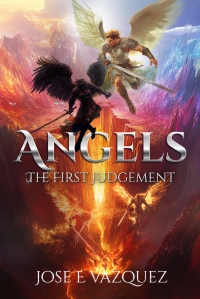ANGELS
INTRODUCTION
INTRODUCTION
ANGELS!
Who are they?
Where do they come from?
Are these entities real or imaginary?
We have so many questions; the answers are few and elusive, sometimes even contradictory. Since we do not know much about these spiritual beings, our perception of their existence is hindered by ignorance. Furthermore, such perception is biased by our religious beliefs, our eagerness to accept the intangible, and our optimistic view of life. Even our overlaying insecurities and hidden fears could play a role in what is and what is not believable to us.
Modern angels are frequently portrayed as dolls that adorn our shelves or our Christmas trees. We see their images illustrated in our churches, books, and movies; however, such appearances are usually portrayed as humanized figures with a pair of wings and angelic faces!
Reading the Bible , we find out that the angel described by Daniel was an Archangel named Gabriel, and the angels Isaiah saw were Seraphim. We also uncover that both men were scared to death at the incredible sight of their angelic forms and faces. Even our present outlook on the cute baby angels whom we call Cherubim is not even remotely close to the description that Ezekiel gave us about them, “Fire creatures with four wings and four faces.” Upon facing a Cherub, I do not think that any of us would have the courage to call the identity “cute!” Accordingly, the angels were and are powerful creatures that leave everlasting impressions on whoever has the fate to meet them.
Nonetheless, why do they appear so elusive, so out of reach?
Considering this, is there any possibility of meeting an angel in our lifetime?
Such an encounter is possible; however, in case we do, a possibility exists that we would not recognize such an entity as being an angel.
Why? Because angels rarely emerge in their natural form, they prefer to assume our human form. In addition, it is common theological teaching, by at least the Catholic Church, that a guardian angel is appointed at our births to guide and protect us. If you believe in such a statement, an angel is in reality, close to you and me!
Sometimes, I even wonder about the voice inside our heads, which we call our “conscience.” Could it be the voice of an angel?
Everything gets more complicated once we get inside our heads because our minds can identify the presence of more than one voice. Both voices are diametrically opposite. One is from our guardian angel trying to help us; the other is from a malevolent voice leading us into temptation to do mischief and evil.
One is for good and the other for evil, for light and for darkness, for obedience and for disobedience, for love and for hate!
The first voice arose from an angel, the second from a fallen angel; we also know the latter by a different name, as a demon or the devil!
Our guardian angels are constantly chiseling us, making our appearance more acceptable to God’s standard: perfection! The devil is committed to doing the opposite!
Whom should we believe?
As long as we are alive, we have a choice!
Returning to our inquiry, we ask: Do we know the names of the angels?
Other religions than my own, Roman Catholicism, have a more extensive list of angels' known names. I checked my Bible for such names.
This book mentions the names of only three Archangels: Michael, Gabriel, and Raphael. Up to today, these are all the official sanctioned names of the good angels.
Many years ago, in the early Church, more names existed that were venerated; nevertheless, due to contradictions related to their loyalty to God, those angels were dropped from the list.
We also know the name of the fallen angels’ leader: Lucifer, better known in this modern age as Satan!
The task became overwhelming when I tried to find more names of the good or evil angels. Many names have variations, and different names merge into the same individual. The worst is the realization that separating the good angels from the evil ones becomes almost impossible.
How did this confusion get started?
Where do we get this information if it is not in the Bible?
At the beginning of the human race, our knowledge of the angels was practically none; since then, this knowledge has become progressive. This means that as time has passed, we have a better image of these creatures.
Old Testament passages pointed out that the people experiencing the event cannot always tell if the angels they met were good or evil. Sometimes, it was as if they did not know a difference existed! (e.g., Job referring to “Satan, walking into Heaven.”)
In the New Testament, Christ sharply defined such difference when He said, “I watched Satan fall from the sky like lightning.”
This was an unequivocal statement that the devil did not belong to Heaven after his fall from grace.
To further our search, we know that the Bible has what is called, ‘The Hidden Books.” Texts that were banned from the orthodox scriptures because of their controversial or confusing material. These writings from the Old Testament compiled earlier were translated from Hebrew to Greek around 200 BC and included in what was called “Septuagint.” Later, around the fourth century AD, St. Jerome proclaimed these “Hidden Books” to be apocryphal, meaning that they were not acceptable for the church’s teachings.
The most critical rejected material was the Book of Enoch , written by a man who lived a few generations after Adam and Eve. Enoch loved God so much that He took him to Heaven without dying at the early age of 365 years. Enoch became the father of Methuselah, still the man who lived the longest: 969 years!
Enoch, the reputed author of this apocryphal book, claimed that he visited Heaven and Hell, plus many other places. He had an extensive list of angels’ names; in some instances, he even mentioned some as fallen angels.
Most of the angels’ names we know today came from this book, but due to contradictions and naming inconsistencies caused by many translations, it is impossible to be sure who are the good guys and who are the evil ones. After all, I could not accept assigning a name to a good angel where such a name might be of a demon! To clear my uncertainty about choosing names, I searched for help in other books about angels.
Therefore, I asked my church pastor for a good book; he lent me “A Dictionary of Angels.” The author compiled a vast list of angels and demons in this book, including variations and contradictions. He admitted to spending fifteen years accumulating this information. He also mentioned that his frustration in trying to separate the good from the evil reached an unbelievable level, causing him to approach insanity. Consequently, he decided to state the data without passing any final judgment.
I only spent a few weeks researching the subject and already felt hopeless, so you can imagine that I readily agreed with his point of view about the confusion. Unfortunately, I did not extract one single name to add to the ones I already knew.
Here is another touching subject.
Why are there so many differences among the angels?
Is there a Heavenly Hierarchy?
Appropriately, the Bible says that not all angels were created equal. Therefore, a serious effort was made to determine how they were ranked. The accepted hierarchy, as seen by Dionysius, a Greek converted to Christianity by Saint Paul, remains as follows:
There are nine Choirs cataloged into three Groups or Triads.
The Highest Group: (The one closest to God.)
1- Seraphim
2- Cherubim
3- Thrones
The Middle Group:
4- Dominations
5- Virtues
6- Powers
The Lowest Group:
7- Principalities
8- Archangels
9- Angels
I agree with this list, except for the Archangels, since most were Seraphim or Cherubim. Furthermore, they were like Overlords in charge of whole Choirs; I will place them at the top of the ranking.
From the scriptures, in the book of Tobit, Archangel Raphael told us.
“I am Raphael, one of the seven angels who enter and serve the Glory of the Lord.”
Out of these seven, we only recognize three valid names: Michael, Raphael, and Gabriel.
Lucifer’s name is also considered accurate; all other names in the book are fictitious.
From the little we know about the existence of the angels before the creation of man, we can only deduce that they were given the same choice between Good and Evil as we presently face. However, unlike our current scenario, we could sin against God but still have the opportunity to repent and ask for forgiveness. This act could allow us to enter Heaven; the angels faced a different predicament. They only had to make one choice; unfortunately, this was as permanent as eternity!
All angels must have been created without sin, which is an act of disobedience to what our Creator expects from us. Sin is a choice that encompasses the denial of God’s will. For the angels, this step could not have happened in an instant. You cannot be an innocent creature full of love at one moment and become full of hate the next second; it took time for this gradual change.
It is not different from the way we are presently. If you are a person full of love for everyone around you, even if somebody did wrong to you, your first thought would not be to murder that person. However, suppose you gradually lower your moral values, letting anger, hate, envy, lust, lies, greed, and pride take over your soul. In that case, even murder becomes an option to satisfy your passions.
I see the angels as an alien race facing the same dilemma as us: to recognize God’s existence and accept His commands. This similarity is the driving force behind such parallelism between our races, and it implies the following: As a civilization reaches a technologically advanced status, it becomes highly materialized and intellectually dependent. The harder we try to explain God’s existence under such terms, the more elusive that understanding becomes; only something that comes from the inner heart, something as intangible as love, can make such a connection; it can open our eyes to perceive what we cannot see.
If an angel civilization ever existed, the angels must have lived very long lives, long enough for some individuals to gradually believe that they were eternal, and they were gods!


